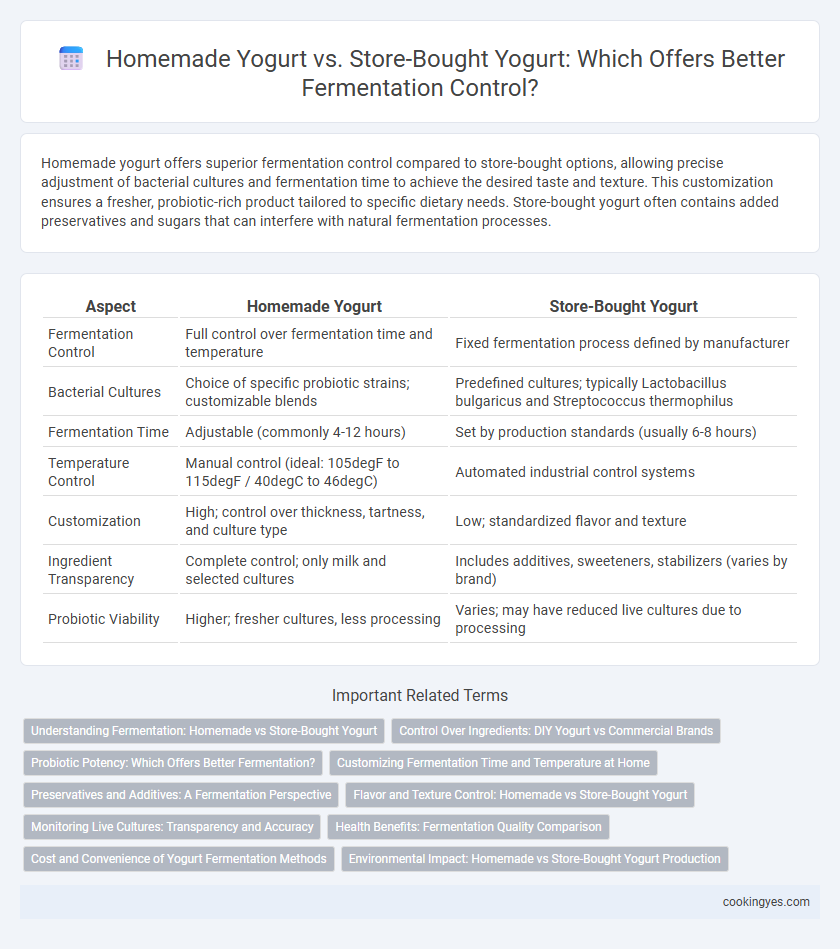Homemade yogurt offers superior fermentation control compared to store-bought options, allowing precise adjustment of bacterial cultures and fermentation time to achieve the desired taste and texture. This customization ensures a fresher, probiotic-rich product tailored to specific dietary needs. Store-bought yogurt often contains added preservatives and sugars that can interfere with natural fermentation processes.
Table of Comparison
| Aspect | Homemade Yogurt | Store-Bought Yogurt |
|---|---|---|
| Fermentation Control | Full control over fermentation time and temperature | Fixed fermentation process defined by manufacturer |
| Bacterial Cultures | Choice of specific probiotic strains; customizable blends | Predefined cultures; typically Lactobacillus bulgaricus and Streptococcus thermophilus |
| Fermentation Time | Adjustable (commonly 4-12 hours) | Set by production standards (usually 6-8 hours) |
| Temperature Control | Manual control (ideal: 105degF to 115degF / 40degC to 46degC) | Automated industrial control systems |
| Customization | High; control over thickness, tartness, and culture type | Low; standardized flavor and texture |
| Ingredient Transparency | Complete control; only milk and selected cultures | Includes additives, sweeteners, stabilizers (varies by brand) |
| Probiotic Viability | Higher; fresher cultures, less processing | Varies; may have reduced live cultures due to processing |
Understanding Fermentation: Homemade vs Store-Bought Yogurt
Homemade yogurt allows precise control over fermentation time and temperature, optimizing probiotic development and texture consistency. Store-bought yogurt typically undergoes standardized industrial fermentation processes, limiting customization but ensuring uniform product quality. Understanding these differences helps consumers choose between tailored probiotic benefits in homemade yogurt and convenience with guaranteed safety in commercial options.
Control Over Ingredients: DIY Yogurt vs Commercial Brands
Homemade yogurt offers precise control over ingredients, allowing selection of high-quality milk and probiotic strains while avoiding additives, preservatives, and excessive sugars commonly found in commercial brands. This control enables tailored fermentation conditions that enhance probiotic potency and nutritional value. In contrast, store-bought yogurt often contains stabilizers and flavorings that can affect fermentation efficacy and overall health benefits.
Probiotic Potency: Which Offers Better Fermentation?
Homemade yogurt often contains a higher diversity of live probiotic strains due to its customizable fermentation time and temperature, which enhances probiotic potency compared to many store-bought options. Store-bought yogurt may contain added stabilizers and preservatives that can inhibit probiotic activity, reducing overall fermentation control. Controlled fermentation in homemade yogurt typically results in a richer concentration of beneficial bacteria like Lactobacillus acidophilus and Bifidobacterium, promoting better gut health.
Customizing Fermentation Time and Temperature at Home
Homemade yogurt allows precise control over fermentation time and temperature, enabling customization of flavor, texture, and probiotic content to personal preference. Store-bought yogurt undergoes standardized fermentation in factory settings, limiting variability and personalization. Controlling fermentation conditions at home promotes higher probiotic diversity and tailored acidity levels unmatched by commercial alternatives.
Preservatives and Additives: A Fermentation Perspective
Homemade yogurt offers superior fermentation control by eliminating preservatives and additives commonly found in store-bought yogurt, which can inhibit the activity of beneficial bacteria such as Lactobacillus bulgaricus and Streptococcus thermophilus. The absence of stabilizers and artificial flavors in homemade yogurt ensures a purer fermentation process, promoting higher probiotic viability and enhanced gut health benefits. Store-bought yogurts often contain thickeners, sweeteners, and preservatives that can alter the natural fermentation balance, potentially reducing the effectiveness of live cultures.
Flavor and Texture Control: Homemade vs Store-Bought Yogurt
Homemade yogurt offers superior fermentation control, allowing precise adjustments to fermentation time and temperature that directly influence flavor depth and texture creaminess. Store-bought yogurt often contains stabilizers and additives, which can limit texture smoothness and produce a more uniform but less customizable flavor profile. Choosing homemade yogurt enables tailoring fat content and bacterial culture strains, resulting in a richer, tangier taste and a thicker consistency compared to many commercial varieties.
Monitoring Live Cultures: Transparency and Accuracy
Homemade yogurt allows precise control over fermentation conditions, enabling active monitoring of live cultures to ensure optimal bacterial growth and potency. Store-bought yogurt often lacks detailed transparency regarding the specific strains and viability of probiotics, making it difficult to assess fermentation accuracy. Accurate monitoring in homemade yogurt results in tailored probiotic content and consistent quality, enhancing digestive health benefits.
Health Benefits: Fermentation Quality Comparison
Homemade yogurt allows precise control over fermentation duration and temperature, producing a higher concentration of live probiotics, which enhances digestion and boosts immune health. Store-bought yogurt often contains added sugars and stabilizers that can reduce probiotic effectiveness and overall nutritional value. By customizing fermentation parameters, homemade yogurt delivers superior health benefits through optimized bacterial strains and increased bioavailability of nutrients.
Cost and Convenience of Yogurt Fermentation Methods
Homemade yogurt offers greater control over fermentation time and ingredient quality, allowing customization to taste and probiotic content, often resulting in cost savings compared to store-bought options. Store-bought yogurt provides unmatched convenience with ready-to-eat packaging and consistent flavor profiles, ideal for consumers seeking quick access without fermentation management. Balancing cost-efficiency and hands-on preparation, homemade yogurt suits fermentation enthusiasts while store-bought yogurt appeals to those prioritizing ease and time-saving benefits.
Environmental Impact: Homemade vs Store-Bought Yogurt Production
Homemade yogurt production significantly reduces environmental impact by minimizing packaging waste and lowering transportation emissions compared to store-bought yogurt, which involves large-scale manufacturing and extensive logistics. Using local milk sources and reusable containers further decreases carbon footprint during homemade yogurt fermentation. Store-bought options often rely on plastic packaging and refrigeration throughout distribution, contributing to higher greenhouse gas emissions.
Homemade Yogurt vs Store-Bought Yogurt for Fermentation Control Infographic

 cookingyes.com
cookingyes.com